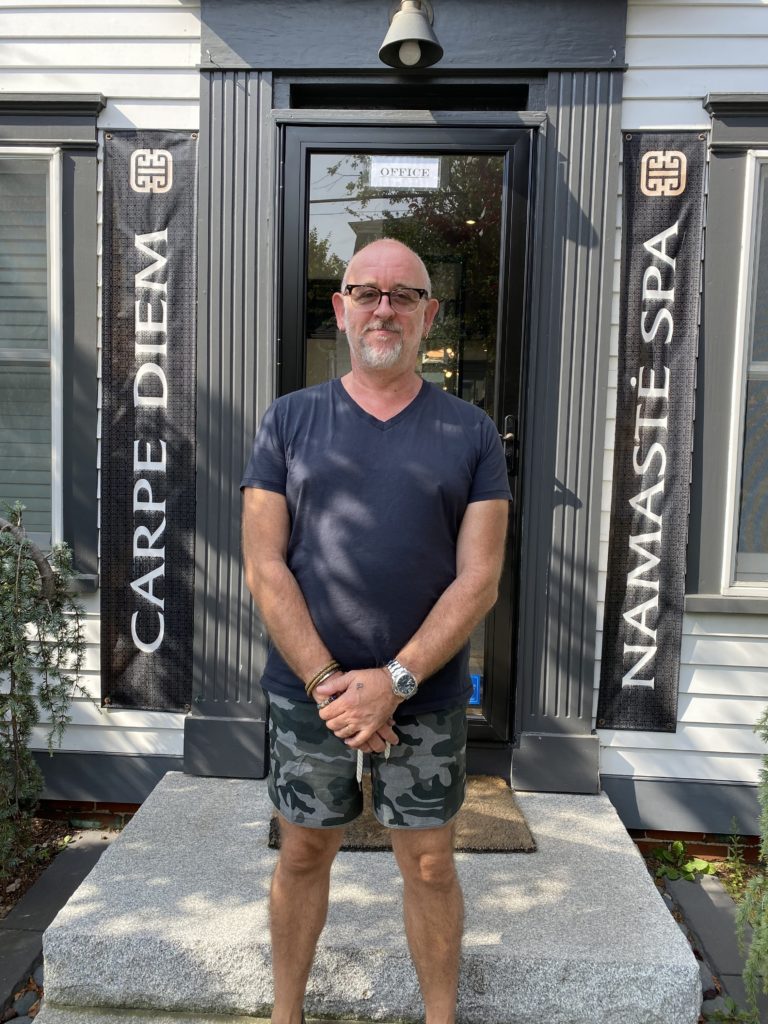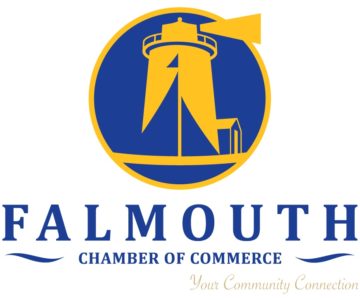When the summer season started in early June, reservations at the Carpe Diem Guesthouse and Spa in Provincetown were way down. Due to COVID-19, 70 percent of the inn’s regular customers had cancelled, reducing occupancy to just 30 percent.
“It was really grim,” says co-owner Stephen Hooper. “We were very unsure what would happen.”

To help with the cash flow, Hooper received Paycheck Protection Program (PPP) loan, without which, he says, “we would not have survived.”
That’s a sentiment shared by Adam Cullin of Cape Cod Dog Center, a dog daycare and boarding facility in Mashpee. Cape Cod Dog Center was considered an essential business so it didn’t have to close, but its daily clientele was reduced significantly, limited largely to dogs owned by emergency workers.
The PPP is a federal aid program where banks fund loans to businesses. Businesses may then apply for forgiveness, and if eligible, the federal government repays the loan.
“The PPP was essential,” says Cullin. Without it the business would likely have had to close. Instead, the business didn’t have to lay-off or furlough any employees, although some did experience reduced hours.
Among the many banks administering some of those PPP loans was The Cooperative Bank of Cape Cod. All totaled, reports Chief Commercial Banking Officer Peter Rice, “The Coop” dispersed 927 PPP loans totaling $77.5 million.
During the first phase, the bank loaned $60 million, mostly to larger businesses. In the second phase, the bank loaned $17.5 million, mostly to smaller businesses. Loans ranged from less than $1,000 to more than $3 million. The average loan in the first phase was $113,000, and the average in the second phase was $44,000, for an overall average of $84,000.
“We estimate that helped save 15,000 jobs right here on Cape Cod which is really exciting,” says Rice.
It was a major effort for The Coop. PPP loans made up 8 percent of the bank’s loan portfolio, compared to 5.5 percent in other similar-sized banks in The Coop’s peer group.
“We were really proud that we were able to do that,” says Rice. That money, he adds, is now flowing through the economy.
Applying for his company’s PPP loan at The Coop was “effortless,” says David Ricardi, owner of David Ricardi Designs, an East Dennis company that designs and installs kitchens and baths. “Within three days my application was filled, and a week later I had money in my account.”
“We were literally shut down for three months, there was no traffic in our showroom,” recalls Ricardi. Since walk-in traffic accounts for 50 percent of the company’s installations, that hurt business.
Cape Cod 5 has assisted more than 2,000 local businesses to obtain authorization of funds from the PPP. The bank estimates this will help local businesses retain and continue to pay more than 10,000 workers in the region.
Strengths And Weaknesses
Even with the PPP loans, some businesses have fared better than others. While restaurants and small local retail stores have been hard hit, construction and real estate are going strong.
“The winners will do better than ever before, the losers won’t come back,” says Gary Logie, owner of LogieCPA, a Hyannis-based accounting firm.
“Home sales have never done better,” observes Logie, noting also that as people are forced to spend more time at home, they’ve turned their attention to improving their houses and gardens, perhaps putting on an addition and installing a sprinkler system for the lawn.
Perhaps no industry has experienced more turbulence than the airline industry. That’s true of Cape Air, which employs more than 700 people and operates about 100 planes throughout the Northeast as well as in the Caribbean, Montana and Missouri. When the pandemic shutdown started, founder and CEO Dan Wolf says business dropped 90 percent. It’s now down between 60 and 70 percent.

The airline saw improvement in the spring, but then business dropped again in July and August. Wolf attributes that to the spikes in infections that occurred in southern states. “I think nationally, everyone got very nervous about travelling again,” he says.
Wolf says a drop in business of 60 to 70 percent wasn’t sustainable, so he obtained a PPP loan. “That’s what’s allowed us to survive,” he says.
No employees were laid off, though about 50 did take voluntary furloughs due to health concerns. Wolf says the loan should get the airline through the end of September, at which time he hopes additional federal aid is available.
“Now I think things are very uncertain,” says Wolf.
Impact On Nonprofits
The pandemic is affecting nonprofits as well. Events are often the lifeblood of such organizations, and so funding has been impacted. Many nonprofits turned to hosting their traditional fundraisers virtually.
“We’re definitely all weathering a tough storm,” says Lauren Barker, CEO of Cape Cod Young Professionals, whose mission is to connect Cape Cod’s emerging workforce and community leaders, engages them in the community and supports their efforts to advance, personally and professionally. CCYP was forced to cancel its Shape Your Cape summit, one of its biggest events. Rather than hold live events, the organization has switched to virtual talks with local experts on topics such as how to navigate emergency funding programs. They also created an online job board.
“We’ve had a ton of interest in that, a lot of good jobs too,” says Barker.
The CCYP surveyed its members in April and May, the results of which are posted on their website (https://capecodyoungprofessionals.org). Another survey is planned for the future. Barker reports that some members are busier and more successful than they’ve ever been, and others are struggling.
“We were surprised to see from the survey that not that many were laid off… more likely they were furloughed or had hours cut back. The most common thing we saw was that they had transitioned to working from home,” notes Barker. “What people are looking for is a sense of community and a trusted source of information, and we’re going to continue to provide that. There are a lot of unknowns but we’re working as hard as we can to continue our mission even though the ways that we do that look different.”
The Massachusetts COVID-19 Relief Fund raised $31.4 million to support Massachusetts residents during the pandemic. To date, it has distributed $31.2 million in funds and is in the process of distributing the remaining funds to nonprofits across the state. Over the course of 12 weeks, The Cape Cod Foundation received a total of $876,000 from the fund to strategically deploy on Cape Cod.
“The support we received from the Massachusetts COVID-19 Relief Fund has had a tremendous impact in the community,” said Kristin O’Malley, president and CEO of The Cape Cod Foundation. “By working closely with our nonprofit leaders and community partners, we have been able to target those resources quickly and strategically to get help where it was needed the most.”
O’Malley said the foundation has now raised more than $1.51 million from discretionary resources, individual donors, corporate partners, and foundations for its Strategic Emergency Response Fund and distributed $1.17 million to support COVID-19 relief. The grants, which have been made over the last 14 weeks, have supported 44 local nonprofit organizations.
O’Malley said fundraising will continue and more grants are planned to address the immediate and long-term needs of the community due to the pandemic.
The Community Foundation of Southeastern Massachusetts has awarded $665,000 in grants to nonprofits providing significant emergency support for immigrants, emergency childcare facilities, and local college students in need in the South Coast area.
“We remain vigilant and committed to doing all we can to meet the needs of our community during this unprecedented time,” said Jim Scherer, president and CEO of the YMCA. “With the award of emergency relief funds, we have been able to expand the availability of emergency day care to three of our six sites: New Bedford, Swansea and Wareham….Through our partnerships with local organizations, we have been able to distribute over 80,000 meals to families in need.”
The Bristol Community College Foundation, along with the UMass Dartmouth, received a grant to provide direct support for students, covering expenses such as inability to pay rent and food insecurity.
The Cape’s artistic community received a boost from the Arts Foundation of Cape Cod’s Cape Cod Arts Relief Fund and small businesses were assisted by Love Live Local (see Last Word column in this issue).
Changing Mindset
All businesses have been forced to innovate. According to Peter Forman, president and CEO of the South Shore Chamber of Commerce, businesses in his area have met the pandemic with a sense of defiance and optimism.
“For the most part, there’s a general optimism that they survived the spring,” says Forman.
But he says almost everyone has had to rethink their operations and make adjustments.
Some businesses have seen the pandemic as a call to reinvent themselves. For example, many healthcare practices have accelerated a move to telehealth, and fitness coaches and music teachers have figured out how to offer their services remotely. Other services have begun offering childcare. And certainly the pandemic has sparked a massive digital transformation.
“People are innovating not only how they provide services but what they provide,” says Forman.
Cape Air, for example, introduced a new service called CAPE, or Cape Air Personal Experience, In response to the drop in business as well as public hesitation to fly in crowded flight cabins, the new service capitalizes on the airline’s large fleet and allows customers to charter the entire airplane.
Wolf says the new service is attracting many customers in the Northeast and the Caribbean. “It’s been very successful,” he says.
In addition to altering its daily operations, such as in the way breakfast is served and how rooms are cleaned, the Carpe Diem Guesthouse and Spa also changed the way it attracts customers. The guesthouse normally caters to visitors from Europe, the West Coast and Chicago. Now all its guests are from within driving distance. Hooper credits the Provincetown Tourism Office for making a big effort to promote business on social media and in pop-up ads, and says they’ve also been successful with Google ads targeted within key geographic regions.
Winter Is Coming
Perhaps no one has his fingers on the pulse of the local economy more than Logie, who serves many small business clients from his Hyannis office. He’s concerned about the pandemic’s impact on the Cape’s seasonal businesses, which must do well in the summer to ride out the winter.
“When you analyze the numbers they’re doing great compared to May but not compared to this time last year,” says Logie, who predicts there will be many business failures this winter. “January will be the month of reckoning. Unless we can get back to normal quickly this will roll up into a big mess.”
Logie is concerned that the overall economy will decline as customers run out of money to spend, that businesses will continue to suffer supply chain problems, and that some businesses that received PPP loans may face tax implications in April. He advises businesses to conserve cash as best they can.
Rice agrees.
“Cash flows in the summertime and slowly dissipates in the winter as people spend down their reserves. People are not going to be going into the off-season with the same degree of reserves they had in the past.”
Rice recommends that business owners plan cash flow carefully and work with vendors to defer payments if possible.
“The common refrain has been ‘we’ll all get through this together,’ and virtually all businesses are doing that. Luckily we have a decent summer economy going, maybe not normal or great, but decent,” says Rice.
As for the PPP loans, Rice says that while the IRS and Congress are still debating how businesses account for the spending of PPP funds, it’s important to keep detailed records. “My expectation is that the vast majority [of businesses] will achieve full or nearly full forgiveness,” he says.
“Most businesses will survive, the question will be how many people lose jobs and how long will it take them to find new jobs. That had longer term economic implications,” says Forman.
From his perspective, Ricardi says business is now picking up. Given the three-month project cycle for kitchens and baths, he predicts a good fall and winter.
“All the phone calls I get are very positive. People think the pandemic is coming to an end. People are excited,” he says.























